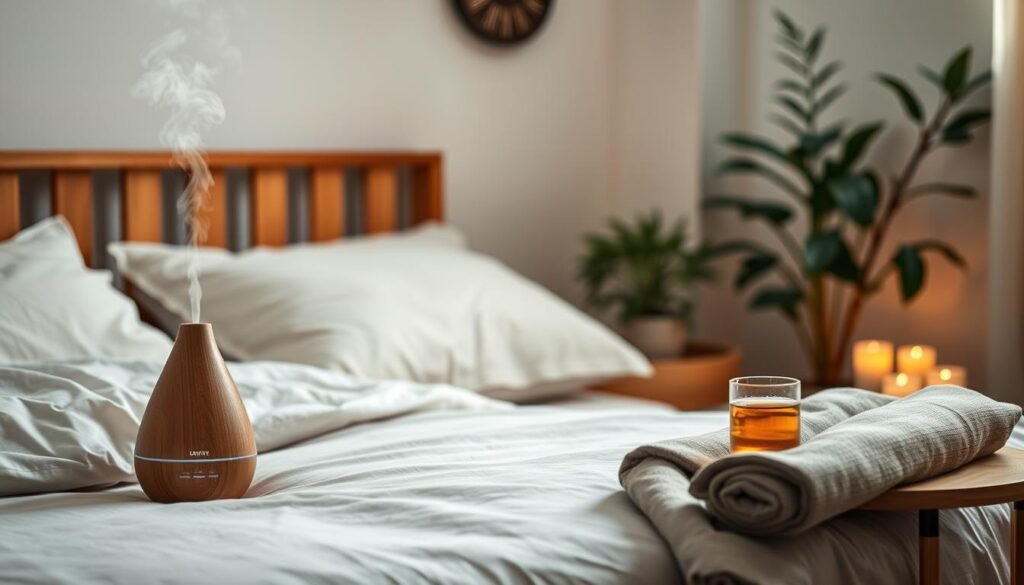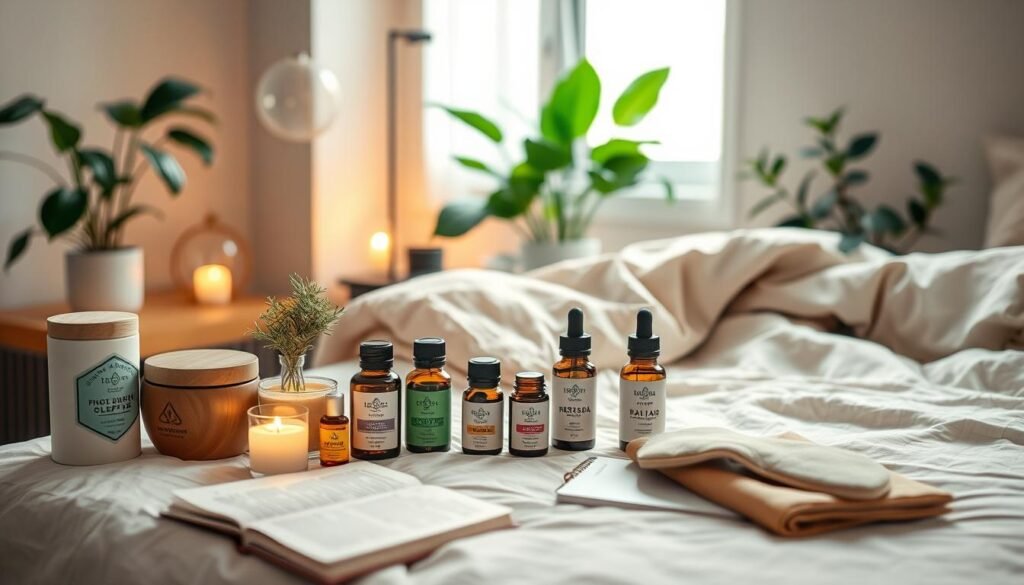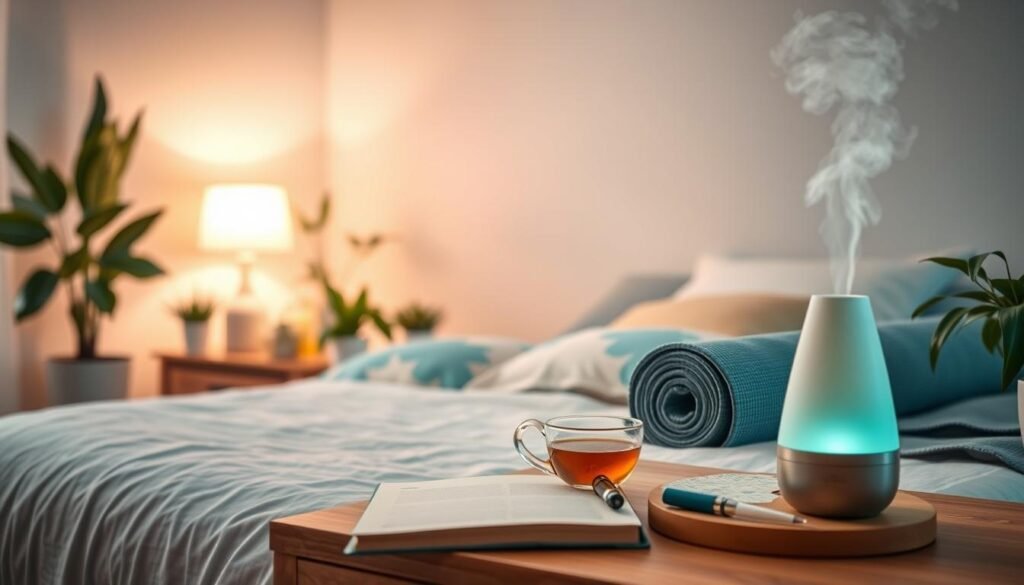Recent studies show that regular exercise improves sleep quality. Yet, some people experience trouble sleeping after evening workouts. They seek effective remedies to combat post workout insomnia and sleep better.
To battle insomnia after working out, understanding the link between exercise and sleep is key. This article covers strategies from nutrition and timing to natural sleep aids. With these tips, restorative sleep can be yours.
Key Takeaways
- Finish workouts at least 3 hours before bedtime for optimal hormone balance.
- Stay hydrated post-exercise to maintain body temperature and avoid dehydration.
- Opt for non-caffeinated beverages like Chamomile or Tulsi tea to aid sleep.
- Maintain a consistent sleep schedule to enhance overall sleep quality.
- Consider yoga or deep breathing as part of a bedtime routine to improve sleep patterns.
- Address underlying causes of insomnia, such as anxiety or stress, by consulting with healthcare professionals.
The Connection Between Exercise and Sleep
Exploring how physical activity impacts rest sheds light on exercise’s role in improving sleep quality. Those who exercise regularly enjoy better sleep and have fewer sleep issues. For example, a survey found that active people reported 33% fewer sleep problems.
How Does Exercise Influence Sleep Quality?
Moderate aerobic activities significantly enhance the quality of sleep, especially the deep slow wave sleep phase. This phase is key for recovery. The timing of workouts can affect how well you sleep. While evening exercises don’t disturb everyone’s sleep, people sensitive to endorphins should pick their workout times carefully. Keeping a consistent exercise schedule is also crucial.
The Role of Endorphins in Sleep
Physical activity releases endorphins, improving mood and reducing anxiety. This helps you fall asleep faster and sleep longer. Finding the right balance between workout intensity and timing optimizes these sleep benefits. This balance improves overall sleep quality without causing disturbances.
| Type of Exercise | Impact on Sleep Quality |
|---|---|
| Moderate Aerobic | Increases slow wave sleep, better overall rest |
| Evening Workouts | May increase alertness, affecting sleep |
| Light Stretching | Helps with relaxation, improves sleep preparation |
| Yoga | Lowers anxiety, improves readiness for sleep |
For more information on exercise and its positive effects on sleep, check out this resource: improving sleep through exercise. It offers great tips for fine-tuning exercise routines to enhance rest.
Understanding Post Workout Insomnia
Many people find themselves lying awake after a workout. This trouble sleeping can ruin a productive day. Knowing why this happens can help us fix it. Exercise affects sleep in many ways.
What Causes Insomnia After Exercising?
Several factors cause insomnia after working out. Working out too close to bedtime can keep you awake. It raises your body temperature and makes you feel too energized to sleep. Also, the endorphins and adrenaline from exercising can stop you from feeling sleepy. A messed up sleep schedule or drinking caffeine can make it harder to fall asleep.
Factors Influencing Sleep Disruption
Some things that mess with sleep after exercising are:
- When you work out: Exercising late can mess with your body’s chill-out time.
- Exercise type: Light workouts are better than intense ones for sleep.
- Your health: Issues like anxiety or chronic insomnia affect sleep after exercise.
- Life choices: How much coffee you drink, your hydration, and how you cool down matter.
Understanding the reasons behind sleep issues after exercise helps. It allows people to tweak their routines for better sleep and recovery.
Post Workout Insomnia Remedies
To fight post workout insomnia, it’s key to know how exercise timing affects sleep. Working out hard too close to bedtime can mess up your sleep patterns. It’s best to stop tough workouts at least two hours before bed to help your body get ready to rest. However, doing light exercises in the evening can help you relax and may make sleep better.
Exercise Timing and Its Impact on Sleep
The time you choose to exercise is crucial for good sleep. Working out late can make it tough for the body to calm down. Hard exercise releases hormones like cortisol, making you more alert. This can make it hard to relax, hurting your sleep quality. Also, after a hard workout, your body stays hot. This messes with the body’s cooling down process that helps start sleep.
Choosing the Right Type of Exercise for Better Sleep
Choosing good exercises can help with post workout insomnia. Yoga, stretching, and casual walks are great for sleep after working out. These activities help you relax without using too much energy. Moderate aerobic exercise also helps. It makes sleep deeper and helps keep a natural sleep cycle. Drinking enough water and taking care of electrolytes after working out helps too. Being hydrated keeps your energy up and supports good sleep.

Natural Sleep Aids for Athletes
Athletes often face sleep issues. Natural sleep aids are becoming more popular for them. These remedies help with relaxation and recovery. Melatonin, magnesium, and CBD oil are top choices. They each have benefits that improve sleep quality.
The Benefits of Melatonin for Insomnia
Melatonin helps control our sleep patterns. Athletes use it to fall asleep faster and sleep better. It’s made by our bodies and works well for insomnia problems after hard workouts. Melatonin acts quickly, fixing our sleep-wake cycle in about two hours.
Using Magnesium for Better Sleep
Magnesium is important for muscle recovery and our nervous system. It helps athletes sleep better by calming the mind and body. Eating magnesium-rich foods like greens, nuts, and seeds can keep levels high. This helps improve sleep quality.
CBD Oil: A Natural Option for Sleep Issues
CBD oil is a natural choice for fighting insomnia. It may lower anxiety and help with relaxation. This can be really helpful for athletes stressed by competition or intense training. Using CBD oil for insomnia can lead to healthy sleep patterns. It does this without the negative effects of some sleep drugs.

Choosing the right sleep aids can boost an athlete’s performance and health. It’s key to know the options and talk with doctors. This makes usage safe and effective. For more info on natural sleep aids, visit this resource.
Effective Exercise Recovery Tips
Recovering right after exercise is key to better sleep and stepping up your game. Practical tips for sound sleep can push an athlete’s performance and good vibes. Focusing on what you eat and how you exercise readies you for a good night’s sleep.
Nutrition for Better Sleep After Workouts
Nutrition is vital for recovery sleep post-exercise. Eating a snack with proteins and carbs, like toast with peanut butter or chocolate milk, helps muscle repair. Athletes should get 1.4 to 2.0 grams of protein per kilo of body weight each day for the best muscle recovery. And don’t forget water—drinking about 1.5 liters for each kilo lost during workouts keeps muscles in top shape and prevents sleep troubles.
Light Evening Workouts to Wind Down
Light evening workouts, like yoga or gentle stretches, help calm you down before bed. They ease muscle tightness, making it easier to slip into sleep. Doing these routines tells your body it’s time to rest, reducing the chance of insomnia. This improves sleep quality and helps you recover better.

Post-Exercise Relaxation Techniques
Effective relaxation after exercise can greatly improve sleep. Athletes and those active often have trouble sleeping. Practices that help calmness, like yoga and mindfulness, are essential for winding down.
Incorporating Yoga for Relaxation
Yoga is great for relaxing after workouts. Some poses specifically help with relaxation and getting ready for sleep. Child’s Pose, Viparita Karani, and Legs-Up-The-Wall are very popular. Adding them to your routine can aid relaxation. It also boosts flexibility and overall health.
Mindfulness Practices for Better Sleep
Mindfulness is a strong tool for better sleep. It includes meditation, deep breathing, and relaxing muscles step by step. These reduce anxiety and help focus on now. This lessens distractions before sleep. Studies show these methods, combined with exercise, work well. They lower stress hormones, like cortisol, making sleep more peaceful.
| Relaxation Technique | Benefits | Recommended Duration |
|---|---|---|
| Yoga | Enhances flexibility, promotes relaxation | 20-30 minutes |
| Deep Breathing | Reduces stress, lowers heart rate | 5-10 minutes |
| Progressive Muscle Relaxation | Alleviates muscle tension | 10-15 minutes |
| Mindfulness Meditation | Improves focus, reduces anxiety | 10-20 minutes |
For those dealing with insomnia, these practices can help significantly. Adding yoga and mindfulness to your post-workout routine improves recovery. It has a positive impact on health.
For more tips on exercise and sleep, explore more comprehensive resources.
Establishing Bedtime Routines for Athletes
A consistent sleep schedule helps athletes do their best in sports and thinking. Stars like Tom Brady sleep from 9 PM to 6 AM, showing how crucial sleep is. Setting a bedtime routine helps the body know it’s time to rest, making falling asleep easier.
Creating a Consistent Sleep Schedule
Hitting the bed for 10 to 12 hours nightly is key for athletes. This routine combats the effects of hard training and games. Sticking to the same bedtime and wakeup time every day, even on weekends, is essential. It trains your internal clock for better sleep.
Mary Bender, a sleep and performance expert, believes in consistent sleep and its length. She says it’s part of recovering after activities.
Bedtime Rituals to Enhance Sleep Quality
Adopting calming activities like reading or stretching at night helps. Serena Williams follows such rituals to stay on top of her game. Cutting down on screen time before bed and ensuring a cozy bedroom setup leads to sound sleep.
Evening yoga can also improve sleep without disrupting the natural sleep cycle. For athletes, these nightly habits build a base for great performance and health. To learn more about better sleep practices, checking out different methods and research is a good idea.
The Importance of Core Temperature Regulation
Understanding how our body’s core temperature works is key to better sleep. It shows us how things like exercise and baths affect how well we sleep.
When we work out, our body gets warmer. Then, it cools down. This cool down makes us feel sleepy and helps us sleep deeper.
How Exercise Affects Body Temperature
Exercise really changes our body temperature, especially for those with trouble sleeping. Studies have found that regular, intense workouts can reduce insomnia. They do this by lowering our body’s core temperature at night.
Doing enough exercise improves how long and well we sleep. It’s proven that sticking to the World Health Organization’s exercise guidelines can help stabilize the body’s temperature at night. This is great for fighting insomnia.
The Role of Warm Baths in Sleep Preparation
Taking a warm bath can also help us sleep better at night. The warmth from the bath lowers our body’s temperature when we get out, telling our brain it’s sleep time. This, along with the cooling from exercise, sets the stage for good sleep.
This easy method works with the body’s natural cooling to help us find calm, restful sleep.
Conclusion
Post workout insomnia can really impact an athlete’s health and how well they perform. But, by using some smart sleep strategies, this can be managed better. Things like choosing the right time to exercise, using natural sleep aids, and practicing relaxation methods can help you sleep better after working out.
Studies have found that people who are active tend to have fewer issues with insomnia. This shows how important regular exercise is for good sleep. By knowing how workout times affect sleep and using special tips, athletes can get better at recovering. This helps them do their best in their sport.
Having a regular bedtime routine is key for sleeping well. It makes sure you look after your body and mind. Using these sleep tips not only helps after workouts but also leads to a healthier way of living. It lets you keep up with your fitness goals for a long time.